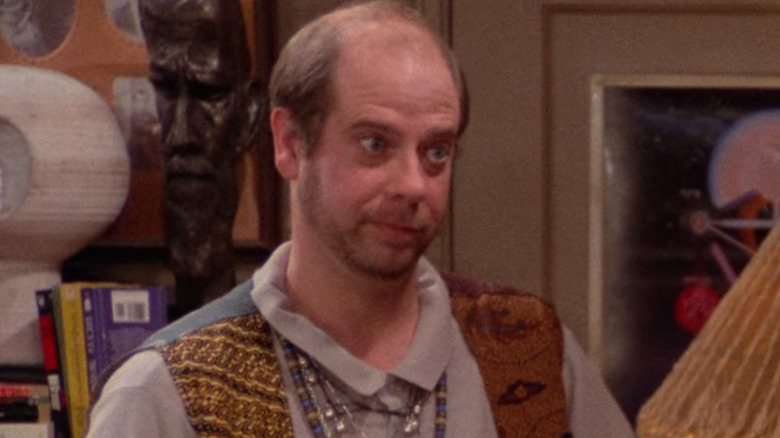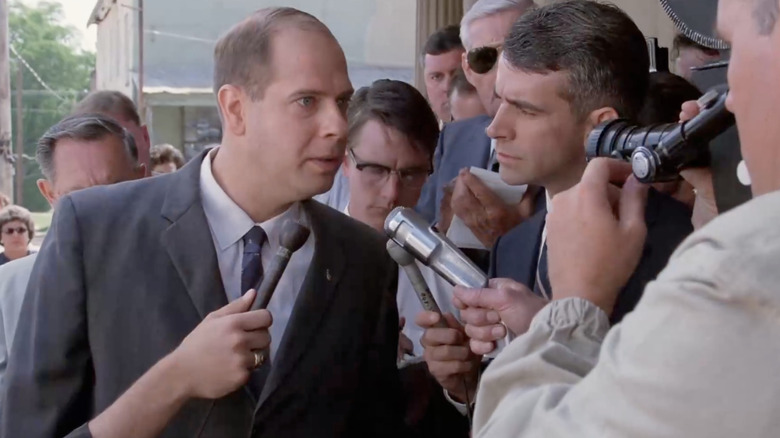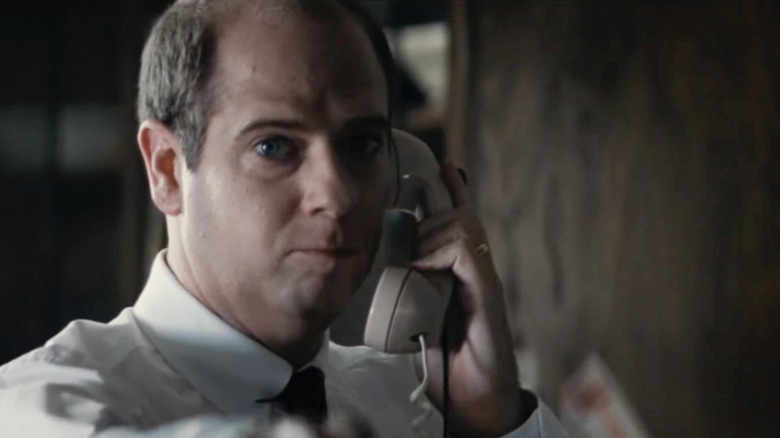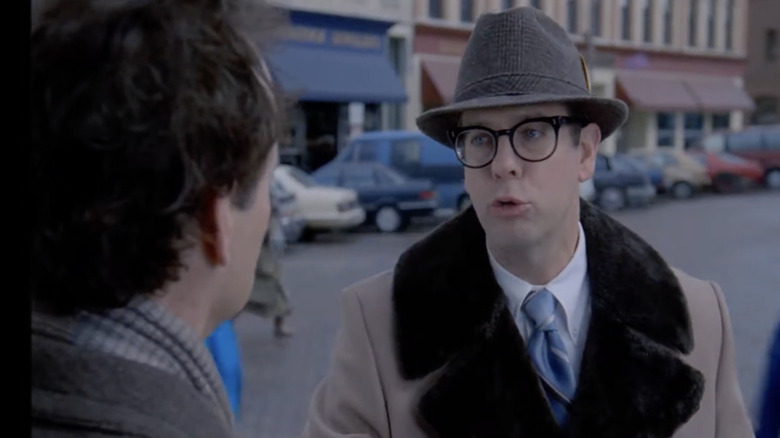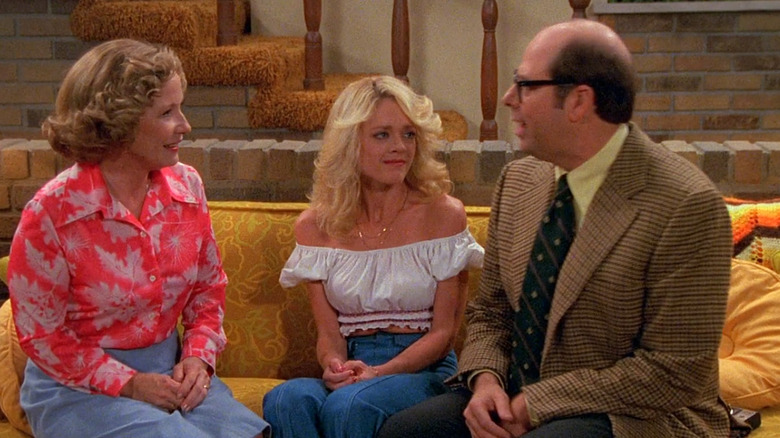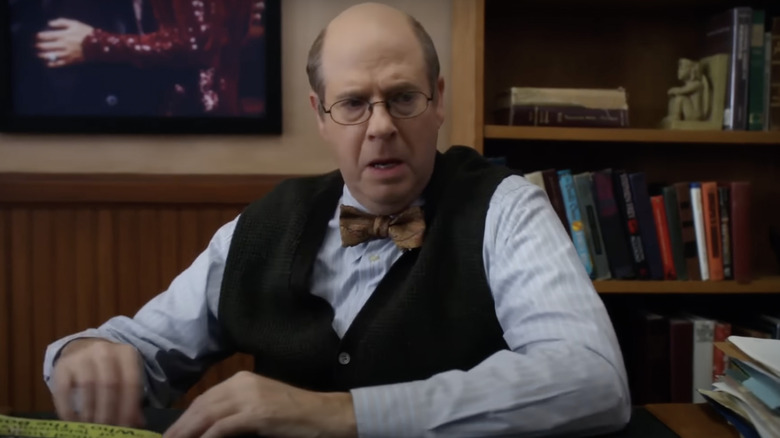Why The Holistic Healer From Seinfeld Season 2 Looks So Familiar
"Seinfeld" featured many recognizable faces in guest appearances over its nine-season run on NBC, including Bryan Cranston, Bob Odenkirk, James Spader, Courteney Cox, Jon Favreau, and Denise Richards. in Season 2, Episode 8, "The Heart Attack," George Costanza (Jason Alexander) goes to the emergency room thinking he is having a heart attack but learns that his tonsils — which had been removed when he was a child — have inexplicably grown back and need to be taken out again.
Kramer (Michael Richards) suggests he go to a herbalist/holistic healer named Tor Eckman, and the notoriously frugal George — enticed by the $38 price tag for Eckman's services — pays him a visit accompanied by Kramer and Jerry.
Tor tells George he was born in the wrong month, then convinces him that the medical establishment is more interested in profits than healing, saying, "You're not a patient, you're a customer." He then prepares George a tea made from cramp bark, cleavers, and couch grass (all of which are actual substances used in herbal medicine).
Jerry sits in silent skepticism before asking Tor for help deciphering a note he had scribbled in the middle of the night, which Tor tells him reads, "Cleveland 117, San Antonio 109" –– a spot-on prediction of the final score of an NBA game between the two teams that wasn't played until 2019, 28 years after the episode aired (via Yahoo). The tea turns George's face purple, sending him back to the ER. But just who is the actor who played this prescient but potentially dangerous holistic healer?
Stephen Tobolowsky played a KKK leader in Mississippi Burning
Tor Eckman was played by veteran character actor Stephen Tobolowsky, who has an astounding 289 acting credits listed on IMDb in his 40-plus years in Hollywood, starting with the 1977 horror flick "Keep My Grave Open" (which can be seen in its entirety on YouTube). Tobolowsky worked consistently throughout the 1980s, with appearances on hit television shows like "Knots Landing, "Falcon Crest," and "Designing Women" as well as a major role in the 1989 Best Picture nominee "Mississippi Burning."
In the film, which lost out that year to "Rain Man," Tobolowsky plays Clayton Townley, the openly racist leader of the Ku Klux Klan. On a 2012 episode of NPR's Fresh Air, Tobolowsky told host Dave Davies how he approached the task of portraying such an unsympathetic character. "I did not intend to play Clayton Townley as one chromosome short of a human being, like a lot of people will play various villains in movies ... In real life, everyone kind of sees themselves as the good guy, doing what they're doing. They see themselves as a kind of hero, and I wanted to make sure Clayton Townley ... wasn't played as some kind of genetic miscreant."
While the lines written for Townley certainly do not evoke much sympathy from viewers, Tobolowsky's own gentle Southern manner (he was born in Dallas, Texas) manages to show through the character's hateful words and despicably violent actions.
Tobolowsky's filmography grew steadily after his appearance on Seinfeld
Fortunately for Stephen Tobolowsky, his captivating performance as Clayton Townley did not lead to him being typecast in similarly detestable bad-guy roles. Two years after he appeared in "Mississippi Burning," Tobolowsky played an FBI agent named Max in "Thelma & Louise," which was released about a month after his hilarious appearance on "Seinfeld."
On an episode of his podcast, "The Tobolowsky Files," he discussed the difference between rehearsing a stage production and a film scene, illustrating his point by telling how he improvised an early sequence in "Thelma and Louise" where he takes sandwich orders from the team of agents who have gathered to hunt down the pair of titular criminals. He went on to credit the magic of the film to director Ridley Scott's flexibility during filming, saying "I have found that the greater the director, the greater the likelihood it is that they enjoy being surprised."
By 1993, Tobolowsky was one of the busiest actors in the industry, appearing in five feature-length films, one TV movie, and four different television series that year.
He is probably best known for playing Ned Ryerson in Groundhog Day
1993 also brought Stephen Tobolowsky what is probably his most well-known role, in "Groundhog Day" as Ned Ryerson, the annoying insurance salesman who repeatedly interrupts the morning stroll of Phil Connors (Bill Murray) to pester his former classmate.
In a 2021 radio interview with CBC, Tobolowsky said that over the years he has been called on to speak about the movie and its message to Buddhist and 12-step recovery groups, as well as the NFL's Oakland (now Las Vegas) Raiders, who at one point used the film as part of their training routine. "I think the movie makes your heart feel healed in a way," Tobolowsky said. "The truths of 'Groundhog Day' are truths that are capable of healing your heart. What we really learn in 'Groundhog Day' is the reason why Bill Murray's character, Phil Connors, changes is because over time he realizes when he is in service to others, the healing process starts ... So the truths of 'Groundhog Day' are not just feel-good truths, but are truths that are capable of healing your heart."
"Groundhog Day" was released two years after Tobolowsky's character on "Seinfeld" was unable to heal George's missing tonsils and swollen adenoids, and the film's popularity led to many more opportunities for him. His single appearance on a hit like "Seinfeld" was an anomaly for Tobolowsky in the '90s, as many of his roles came on short-lived TV shows.
Tobolowsky appeared in many '90s TV comedies, including That '70s Show
Stephen Tobolowsky's first recurring TV role came in the comedy "Blue Skies," which aired just eight episodes in 1994. Two years later he would go on to star as academic administrator Ray Heary on "Mr. Rhodes," appearing in all 17 episodes of that show's only season. That pattern followed Tobolowsky through the CBS comedy "Dweebs," a spiritual predecessor to "The Big Bang Theory" that lacked the later hit's success and aired just 10 episodes in 1995. Seventeen years later, he told Vulture about the ill-fated series, "That was a disappointment when 'Dweebs' was canceled because that was a really wonderful show."
Tobolowsky himself was hardly the kiss of television death, as he made guest appearances on such popular and long-running shows as "Chicago Hope," "The Drew Carey Show," and "Suddenly Susan" later in the 1990s. His bookish look, complete with balding head and glasses, landed him several roles as teachers or professors, including an awkward appearance on "That 70s Show" in Season 2, Episode 4 as Laurie Forman's (Lisa Robin Kelly) psychology professor and momentary love interest.
So far, he has been cast multiple times as a school principal on a TV series. He played Principal Hocksacker on "Mad About You," Principal Flutie in the unaired "Buffy the Vampire Slayer" pilot, and Principal Ball on 43 episodes of "The Goldbergs."
His one appearance on Community holds a special place in his heart
In 2011, Tobolowsky played Professor Peter Sheffield on an episode of "Community" where Abed Nadir (Danny Pudi) delivers a lecture on the sitcom "Who's the Boss?" after being challenged by his professor. The episode aired less than a month after Tobolowsky had open heart surgery following a heart attack.
In an essay for The Wrap, Tobolowsky thanked "Community" director Joe Russo for accommodating his health needs at the time. "Joe approached me first thing and said, 'Today we will work our schedule around you. If you need anything, if you need a break, if something is too much — you just give me the sign and we'll stop.'" Tobolowsky added, "Because of the generosity of spirit shown to me by those in the know at 'Community' and their willingness to step over the line of comfort and give me a job at a moment when I was most afraid, I was able to feel the most overlooked element of the recovery process — a sense of purpose. At a time when my heart was in question, my friends on 'Community' stepped up and offered me theirs. "
Considering how easily he was able to see how "Groundhog Day" was able to heal viewers' hearts in a metaphorical way, it's not surprising that Tobolowsky so quickly recognized how the "Community" show runners were able to help heal his own heart in a more literal sense, while also helping him add to his impressive list of acting credits three decades after his unforgettable appearance on "Seinfeld."
